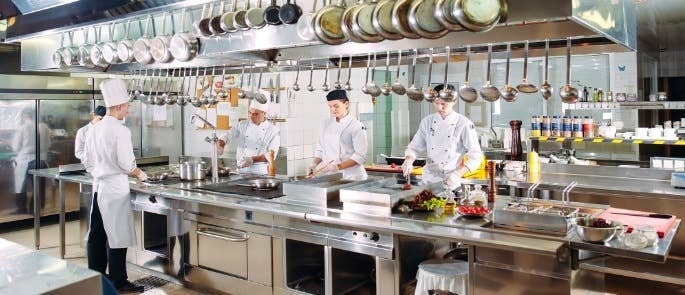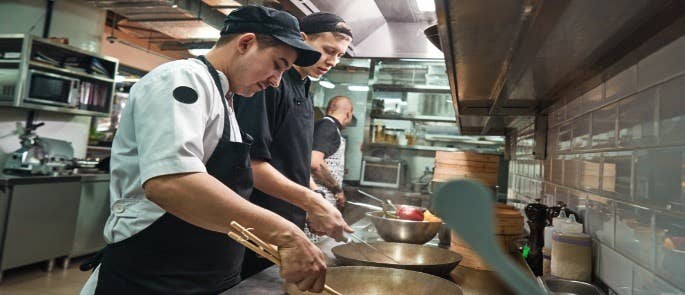Is There a Difference Between a Chef and a Cook?
It is likely that you will often hear the terms cook and chef used interchangeably, and so it can be hard to know what the difference is between them, if any. Both refer to someone who works with food in the kitchen and some would argue that the only difference between the two is a significant pay gap. Here, we unpack some of the perceptions of cooks and chefs, and explain what the real difference is.
What is the Difference Between a Cook and a Chef?
According to the Cambridge dictionary, a cook is ‘someone who prepares and cooks food’, while a chef is ‘a skilled and trained cook who works in a hotel or restaurant’. These definitions imply that a chef is a type of cook, but they differ in that a chef has developed learned skills, and has undergone training. This definition would also suggest that chefs are likely to work in restaurants, or have done so in the past. Although these are the official definitions of a cook and a chef, people who work in the industry tend to have very strong, and often differing, views of what constitutes each. It is these perceptions that we will explore here.

Define Cook
The job title ‘cook’ can apply to those working in many different settings, such as schools, hospitals and prisons. Often, food is not the main priority of the establishment, as it would be in a restaurant. Dishes in schools for example are not prepared with the same level of precision, and the intention may be to provide food purely for fulfilment, rather than as an experience.
However, cooks aren’t just those working in establishments that are primarily non-eateries. Some people argue that cooks exist in restaurants too, and are usually those who follow existing recipes, rarely deviating or experimenting. Others would go as far as to say that cooks merely reheat food, assembling pre-made foods to make a dish.
However, to claim that cooks just reheat food is to diminish the profession entirely. Cooks are generally multi-skilled and are at ease with working in a team as well as on their own. While chefs often specialise, cooks are more well-rounded and are trained to work across the entire kitchen. This means during any one shift they could be producing complete meals of different courses.
One of the main factors that differentiates the two is the degree of knowledge and training that they have had. If working at a restaurant, cooks generally have no, or little, say in kitchen matters such as inventory. Rather, they may prepare food daily, following recipes or a meal plan designed by someone else (such as a chef). Other duties may be allocated and they are likely to hold additional responsibilities, such as cleaning the kitchen.
If you are working as a cook at the moment, there is nothing to stop you from becoming a chef if you want to learn more or perhaps specialise in a certain food, for example becoming a pastry chef specialising in making desserts.

Define Chef
In contrast, a chef typically works in eateries where ingredients tend to be fresher and presentation more considered. Often chefs will have studied and gained knowledge to get to where they are. As a result, they arguably have a greater understanding of techniques and flavours. Furthermore, they tend to know how to make everything from scratch. Good chefs can cook without following a recipe, knowing instinctively from experience what combinations of ingredients work. As well as this, they are constantly trying new things and experimenting with their dishes to create new variations.
As they are given the freedom to create their own recipes, chefs are often partly, if not wholly, responsible for putting together menus. This level of responsibility distinguishes a chef from a cook. Chefs are directly involved with decisions; managers and executive chefs value their input. Often, chefs have management duties in the kitchen, supervising sections in the kitchen as well as other chefs.
Chefs tend to specialise in a particular area of expertise. Their job titles, for example, Chef de Cuisine, Sous Chef and Pattisier (Pastry Chef), reflect this. This hierarchy is termed the Brigade de Cuisine; if you want to know more you can consult our article ‘The Kitchen Hierarchy Explained’. Within these positions, chefs are likely to work in just one section of the kitchen and focus on producing single components of dishes. This means they are highly skilled in their individual area, such as the Sauté Chef who sautés foods and creates sauces.
To progress through the ranks to the position of a chef you must complete thorough training. A professional culinary degree is recognised as one way of developing your knowledge and progressing to becoming a chef. To some, holding a culinary degree is an essential requirement of a chef. Whilst others consider extensive hands-on training under an established chef as an alternative route, often known as a culinary apprenticeship.

Whether you consider yourself to be a cook or a chef, the two roles are not exclusive. Cooks can easily train to become chefs, having already worked in the industry. Likewise, trained chefs may decide to step away from restaurant kitchens and responsibilities, turning to careers that may or may not involve cooking.
What to Read Next:
- The Kitchen Hierarchy Explained: What is the Brigade de Cuisine?
- What Skills Do You Need To Be a Chef?
- What’s the Importance of a Chef Uniform in Hospitality?
- Alternative Careers for Chefs
- Level 3 Supervising Food Safety in Catering Course











